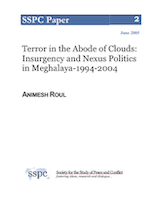Red Terror Strikes in Western Orissa
Of late, Sambalpur district of Orissa becomes a hot bed for Naxal activities. After a period of silence the rebels have again managed to strike terror and this time they have struck hard killing civilians. Late last month, on May 27, the Maoists went on rampage and killed three villagers and injured several others in the Burda village under Jujumura police station. Prior to this the Maoist activities were only confined to abductions followed by ransom. The incident came as a shock as the Maoists generally target the police, forest officials, contractors and other businessmen.








